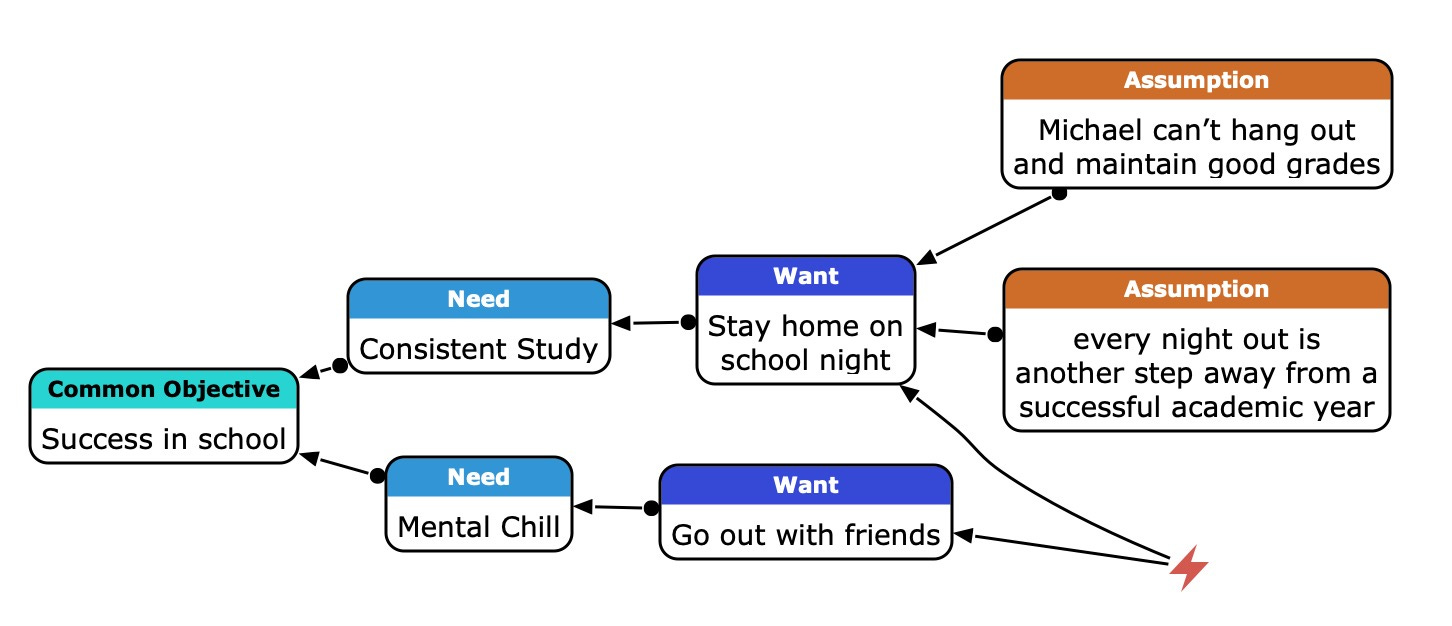Crafting a Win-Win
Resolving Conflicts: A Journey from Assumptions to Understanding
A Typical Evening Clash
Michael's gaze lingered on the vibrant sunset outside his window, a perfect backdrop for the evening he had envisioned with his friends. The recent discovery of a trendy hangout spot downtown had all of them buzzing with excitement. But standing between him and this much-anticipated break was a familiar figure – his father, Robert.
"Dude," Robert started, attempting to use the lingo of his son's generation, "It's a school night. Shouldn't you be, I don’t know, studying?"
Rolling his eyes, Michael retorted, "Come on, Dad. I've been buried in books all week. I need a breather! Everyone's going."
Robert tried to hold back a sigh. "Mike, exams are just around the corner. You can hang out with your friends any time."
Mapping Out the Conflict
An idea suddenly lit up in Michael’s mind. "Hey, remember that weird problem-solving thing you talked about from your work? The cloud something?"
Robert raised an eyebrow, intrigued, "The Evaporating Cloud from the Theory of Constraints? Why?"
"Why don't we use it? Maybe we can figure something out instead of having the same argument every week."
With a hint of amusement and curiosity, Robert agreed. They both sat down, clearing the dining table and placing a blank sheet of paper between them. Michael, drawing from his vague memory of the concept, sketched a cloud in the centre, labelling it "Success in school." They both quickly nodded in agreement that this was their shared goal.
On one side, Robert outlined his concerns: "Consistent Study" leading to the action "Stay home on school nights." Michael, with a smirk, penned down his needs on the opposite side: "Mental Chill", culminating in the action "Go out with friends."
Michael pointed at the "Consistent Study" box, "So, you think if I lock myself up in the room, I'll automatically become Einstein? What if I can prove I can handle both?"
Robert chuckled, "Alright, fair point. But you need to understand where I’m coming from. It’s not about being home. It's about priorities."
Michael leaned back, "Look, it's not like I want to flunk or anything. But hanging with friends, laughing a bit, it's like... resetting my brain, you know?"
Scratching his head, Robert suggested, "Let’s list the assumptions. I assume you can’t hang out and maintain good grades. Two, I think every night out is another step away from a successful academic year."

"And I’ve been thinking you just don’t get it," Michael admitted, "Like you've forgotten how it feels to be a teen."
Challenging the Assumptions
The Evaporating Cloud, with its interconnected desires and needs, lay before them. With the assumptions laid bare, it became clear where the misconceptions lay.
Studying the Evaporating Cloud intently, Robert pondered the assumptions they had listed. One of them stood out: "Going out on school nights inevitably leads to neglected studies." But was that true? Was there no way for Michael to maintain his academic responsibilities and still enjoy some time with his friends?
"Mike," Robert began thoughtfully, "what if we've been looking at this the wrong way? This cloud is showing us our assumptions. And if we challenge the right assumption, maybe we don't need a compromise. Maybe we can find a way to make both our desires work."
Michael raised an eyebrow, intrigued. "Go on."
Robert continued, "We’ve been assuming that going out will always disrupt your studies. But if we remove that assumption and focus on the actual concern - your studies - maybe there's a way."
A Win-Win Resolution
He took a deep breath, "What if, instead of restricting when you can go out, we focus on the outcome we want? That your studies aren't affected."
Michael's eyes brightened with understanding. "So, you're saying, as long as I ensure my academic responsibilities are taken care of, I can go out?"
"Exactly," Robert nodded, "Instead of setting a strict 'stay home' rule, let's shift to an outcome-based approach. Complete all your assignments and homework. And, to ensure you’re well-rested, maybe set a reasonable curfew. How does that sound?"
Michael grinned, "Deal. But only if you stop calling me 'dude'."
Robert laughed, "No promises."
Their disagreements didn’t magically disappear, but they had found a tool to navigate them. And as weeks passed, the balance seemed to hold, proving that understanding could be found, even amidst the turbulence of teenage years.
Reflecting on the Journey
In the unfolding narrative of Michael and Robert, we see the principles of the Evaporating Cloud technique in action. At the heart of their disagreement lies conflicting needs and desires, much like any typical conflict. However, rather than settling into a compromise that could sacrifice one need for another, they turned to the Theory of Constraints tool. By dissecting their shared goal and contrasting desires and then critically examining the assumptions underpinning their beliefs, they unearthed a superior solution. This outcome-based approach, centred around ensuring Michael's academic success rather than policing his time, encapsulates the essence of the Evaporating Cloud: challenging assumptions to find innovative resolutions that don’t merely compromise but genuinely address the core of the conflict.
Read more about the Evaporating Cloud here or see the previous article here.


